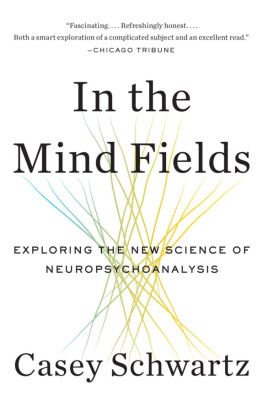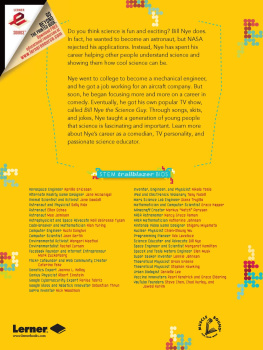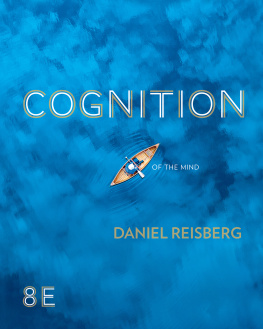Casey Schwartz - In the Mind Fields: Exploring the New Science of Neuropsychoanalysis
Here you can read online Casey Schwartz - In the Mind Fields: Exploring the New Science of Neuropsychoanalysis full text of the book (entire story) in english for free. Download pdf and epub, get meaning, cover and reviews about this ebook. year: 2015, publisher: Knopf Doubleday Publishing Group, genre: Religion. Description of the work, (preface) as well as reviews are available. Best literature library LitArk.com created for fans of good reading and offers a wide selection of genres:
Romance novel
Science fiction
Adventure
Detective
Science
History
Home and family
Prose
Art
Politics
Computer
Non-fiction
Religion
Business
Children
Humor
Choose a favorite category and find really read worthwhile books. Enjoy immersion in the world of imagination, feel the emotions of the characters or learn something new for yourself, make an fascinating discovery.
- Book:In the Mind Fields: Exploring the New Science of Neuropsychoanalysis
- Author:
- Publisher:Knopf Doubleday Publishing Group
- Genre:
- Year:2015
- Rating:5 / 5
- Favourites:Add to favourites
- Your mark:
- 100
- 1
- 2
- 3
- 4
- 5
In the Mind Fields: Exploring the New Science of Neuropsychoanalysis: summary, description and annotation
We offer to read an annotation, description, summary or preface (depends on what the author of the book "In the Mind Fields: Exploring the New Science of Neuropsychoanalysis" wrote himself). If you haven't found the necessary information about the book — write in the comments, we will try to find it.
In the Mind Fields: Exploring the New Science of Neuropsychoanalysis — read online for free the complete book (whole text) full work
Below is the text of the book, divided by pages. System saving the place of the last page read, allows you to conveniently read the book "In the Mind Fields: Exploring the New Science of Neuropsychoanalysis" online for free, without having to search again every time where you left off. Put a bookmark, and you can go to the page where you finished reading at any time.
Font size:
Interval:
Bookmark:


Copyright 2015 by Casey Schwartz
All rights reserved. Published in the United States by Pantheon Books, a division of Penguin Random House LLC, New York, and in Canada by Random House of Canada, a division of Penguin Random House Ltd., Toronto.
Pantheon Books and colophon are registered trademarks of Penguin Random House LLC.
This is a work of nonfiction, but the names of certain individuals as well as identifying descriptive details concerning them have been changed to protect their privacy.
Library of Congress Cataloging-in-Publication Data
Schwartz, Casey.
In the mind fields: exploring the new science of neuropsychoanalysis / Casey Schwartz.
pages cm
ISBN 978-0-307-91152-0 (hardcover : alk. paper). ISBN 978-0-307-91153-7 (eBook).
1. Neuropsychiatry. 2. Psychoanalysis. 3. Neuropsychology. 4. Cognitive neuroscience. I. Title.
RC341.S336 2015 616.89'17DC23 2014046677
eBook ISBN9780307911537
www.pantheonbooks.com
Cover design by Janet Hansen
v4.1_r1
ep
Id never been a science person. I didnt relate at all. So it was with a sense of surprise, a year out of college, that I discovered I loved studying the brain. I was enrolled at UCLA summer school, trying to cobble together the necessary academic credits to apply for graduate school in psychology, the field I thought I wanted to enter. On the list of requirements was a class called Behavioral Neuroscience. I was surprised to see it included there. A decade earlier, it might not have been. But there had been a groundswell in neuroscience in recent years, beginning in the early 1990s, and the field was now an undeniable force in the struggle to clarify and define human mental life. Understanding the brain had become de rigueur for those who wanted to understand the mind. It was another side to the story.
Biology is truly a land of unlimited possibilities. We may expect it to give us the most surprising information, and we cannot guess what answers it will return in a few dozen years to the questions we have put to it. They may be of a kind that will blow away the whole of our artificial structure of hypotheses. So reflected Sigmund Freud in 1920, more than three decades after the great turning point of his working life: from hard science to the purely psychological. Back then, in the mid-1880s, he had been toiling away in labs, peering down microscopes, for going on twenty years. But he would soon arrive at the conclusion that the questions he wanted to answer about the human mind couldnt be answered by what was then understoodor understandableabout the human brain. The knowledge wasnt there and neither were the tools. So he would work with what was available: mental life, in all of its manifestations. He continued to emphasize, however, that eventually, long after his own lifetime, the moment would come when brain science would be ready to fill out the psychoanalytic principles of the mind he was busy laying down.
There are some who believe that moment is here. Yet its doubtful that even Freud could have anticipated just how far apart the two disciplines have grown. Psychoanalysis and neuroscience, with their starkly different goals, methods, and cultures, can appear to be two different species, mutually alienated, as if preoccupied with two altogether different pursuits. In our current moment, the terrain is uneven. Psychoanalysis is a field under siege; neuroscience is the golden child, commanding newspaper headlines, substantial government grants, and an ever-increasing portion of the public imagination. The brain has become our modern metaphor: it is the repository of truth, it is where we look to find out whats really going on. Already, neuroscientific research has penetrated the field of economics, the courts, and beyond. It animates ongoing debates about how our evolving understanding of the brain should affect models of decision making, how it should be taken into account in the carrying out of legal justice. It is decidedly less common to hear psychoanalytic concepts invoked in these same circles.
Despite the real schism between these two fields, there are a growing number of peopleanalysts, scientists, and otherswho are attempting to build a bridge between them, however unlikely the idea, however unimaginable the design. In no sense could this movement be described as mainstream. The word fringe is batted about. Nevertheless, the very struggle to bring some of the old ideas about the mind into the new landscape of the brain is one I believe to be both worthwhile and revealing.
It is a struggle I stumbled upon accidentally, when I entered graduate school with the intention of becoming a psychologist. But it wasnt until afterwards, when Id set aside that goal and become instead the person with the tape recorder observing from the sidelines, that I could finally see the extent of the efforts, the setbacks, the stakes.
It all began so innocently. In the din of the hallway that led to our high school cafeteria my friend Katia, aspiring actress, aged sixteen, turned to me to remark: Thats so Freudian.
I chuckled. Paused. Then asked the question Id been wondering about on some level for years, listening in on all the New York conversations where the subject, in one way or another, came up. By the way, what exactly does that mean?
Oh, you know, its when you repress things into your unconscious, she said.
I would gain no further clarity until I was a sophomore in college, enrolled in a course called Literature and Psychoanalysis. Finally, I was going to understand the mysterious terms Id heard forever, particles in the cultural ether: the unconscious, the conscious, the ego, the id. I believe we started with Civilization and Its Discontents. It was a crowd-pleaser. I didnt know that yet. I was happy to be pleased, to be dazzled, by Freuds radical imagining of the mind.
Against the dulled or vulgar or simplified surface of things, he offered the tantalizing promise of subtext, a deeper truth, a further realm. He dared to challenge the constructions people offered up about themselves; he had the nerve, and the wit, to trace backwards through the years from, lets say, the pinched and upstanding adult to the child unduly fascinated by his own excreta, as Freud puts it. There was a humor in all this, a taste for the absurd, and a blessed lack of squeamishness. Everyonefetishists, onanists, and inverts alikefound a home in Freuds interested gaze. Of course, there were painful moments of Freud on women. His dismissiveness at these times was hard to bear, as much for its failure of imagination as anything else. But I could get past it. His ideas about the human mind were like majestic carpets rolled out to cover vast, empty spaces.
One afternoon, four years later, plunged into Behavioral Neuroscience at UCLA, I noticed that our teaching assistant, a doctoral student named Eric, seemed deflated. Everyone please come stand around this table, he said. He was wearing latex gloves. We gathered around and looked down into a bucket with chemical-smelling liquid swishing inside, from which Eric was suddenly pulling out a brain, holding it up on one flat palm.
Is that a human brain? I said. I was confused by my classmates collective reaction. They were unmoved. They were bored.
Yes! Eric said, perking up, and all day everyones been acting like they dont understand how amazing this is.
Font size:
Interval:
Bookmark:
Similar books «In the Mind Fields: Exploring the New Science of Neuropsychoanalysis»
Look at similar books to In the Mind Fields: Exploring the New Science of Neuropsychoanalysis. We have selected literature similar in name and meaning in the hope of providing readers with more options to find new, interesting, not yet read works.
Discussion, reviews of the book In the Mind Fields: Exploring the New Science of Neuropsychoanalysis and just readers' own opinions. Leave your comments, write what you think about the work, its meaning or the main characters. Specify what exactly you liked and what you didn't like, and why you think so.













